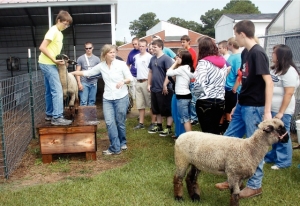Schools receive grants for their FFA programs
By Phyllis Moore
Published in News on September 21, 2012 1:46 PM

News-Argus/BOBBY WILLIAMS
Allison Jennings, agriculture teacher and FFA adviser at Rosewood High School, addresses her students near one of the animal pens outside the school. Rosewood and Charles B. Aycock high schools were recently named recipients of $5,000 grants for their FFA programs.Ä€
Two local high schools have been named recipients of $5,000 grants for upgrades to their FFA agriculture programs.
Rosewood and Charles B. Aycock will receive the Agriculture Education Program Improvement Grant from the N.C. Tobacco Trust Fund Commission.
Rosewood will use the funds to add ventilation and permanent pens to its livestock facility as well as upgrade the watering system in the greenhouse. Aycock's intention is to replace outdated welders and purchase new power tools and a saw to allow agriculture mechanics students to be trained with 21st Century equipment used in the agriculture mechanics industry.
"Right now, we have pens like livestock pens in the barn that are temporary," said Allison Jennings, adviser of the Rosewood FFA. "We're going to build wooden pens.
"We're also going to put some permanent ventilator fans inside the barn as well as a better sanitation system out there."
The school currently has four pens used for animals in the program, she said. Money from the grant will allow them to purchase wood, concrete and other materials, as well as two large fans and a sink.
With 75 students currently enrolled in agriculture classes this semester, Mrs. Jennings said by year's end, the FFA club will have about 100 members.
Schools were allowed to apply for the grant money through the state FFA office, she said.
"This is kind of filling those holes that our funding doesn't cover every year," she said. "This allows us to look at the big picture of our program and make a big difference all at once instead of doing (small projects), make some major updates that will continue our program for several years."
Karen Cox, adviser of the FFA program at Aycock, said the club's roster will probably be around 150 students this year.
The school's agriculture department offers classes in two areas -- horticulture and agriculture mechanics. When filling out the grant application, she said she focused on the latter.
"Our need was more for the ag mechanics," she said. "The grant was written for new welding and shop equipment and new power tools."
Students typically take Ag Mechanics 1 or 2, she said. In the first level, a variety of projects are offered but the most popular is to create a working charcoal grill.
"They take five-gallon drums, use the tools they have in the shop to build a charcoal grill," she said. "They sell them and the money goes back into the program to buy more materials."
The project is especially beneficial, she said, because it allows the students to use every piece of equipment in the shop.
"The equipment that was here, I hate to say it's outdated but it is," she said. "Any time teachers get a chance to take advantage of an opportunity with a grant, (so) you can update things in your program."
It is also beneficial for students in the program to have access to more current tools, she added, whether or not they ultimately go into ag mechanics as a career.
"They have that skill to fall back on," Ms. Cox said. "It helps them with job interviews. I had a kid get a scholarship with Duke Power last year because he could weld."
The schools expect to receive the grant money within the next few weeks.
